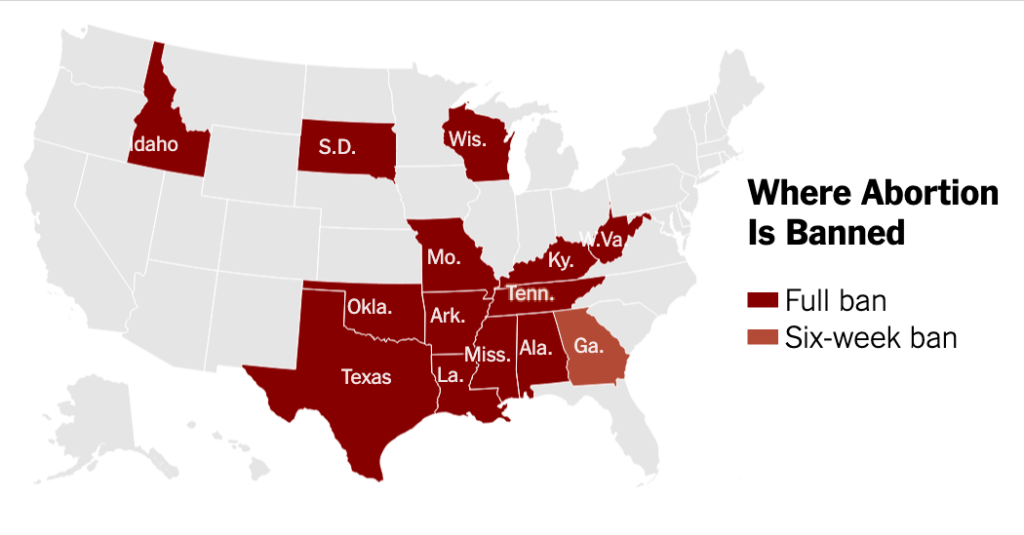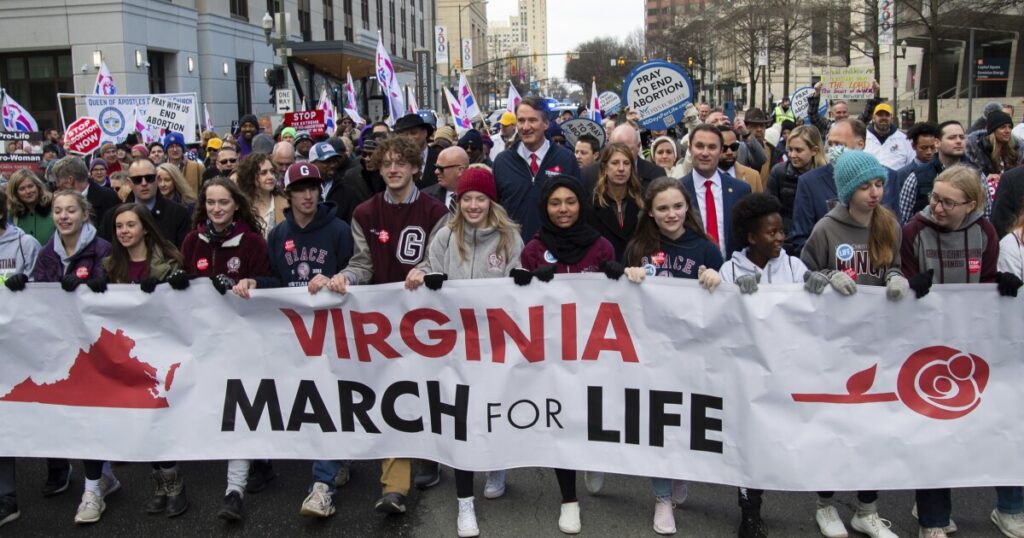In pre-Roe days, abortion was illegal in nearly all states. A handful of liberal states like California had some exemptions for legal abortions when a woman’s life or health were at stake, but the vast majority of American women did not have access to safe and legal abortions. In order to ensure that abortion remained illegal, many states adopted “trigger laws” which stated that if Roe v. Wade was overturned, the existing abortion ban in that state would automatically go into effect.

- In all, 13 states passed these “trigger laws” that banned abortion or restricted access to them following the overturning of Roe v. Wade on June 22, 2022.
Why is it that the southern region of the United States represents the vast majority of abortion bans? Put plainly, it is largely due to the strong influence of conservative and religious beliefs in these states, which have historically been more resistant to the legalization of abortion. Many of these states have enacted these laws in order place restrictions on abortion access that include, mandatory waiting periods, counseling sessions, and parental notification requirements. The concentration of abortion bans in the southern states reflects a broader cultural and political divide between more conservative regions and those that tend to be more progressive on social issues. In order to gain a better understanding of this idea, this article will examine abortion policy in two southern states that have gone different directions in the post Roe era.
Texas
The state of Texas has a history of abortion bans that dates back to the 19th century. The first major piece of anti abortion legislation, however, came to be in 1925 with the aptly named, 1925 Laws. The 1925 Laws makes it a crime to perform an abortion, except when the mother’s life is at risk. The penalty for breaking this law is 2 to 5 years in prison. The Roe v. Wade decision of 1973 deemed this law unconstitutional, but it was never wiped off the books. On Friday, July 1, 2022, the Texas State Supreme Court ruled that the century old law can be enforced.

“Friday’s decision does not permit prosecutors to bring criminal cases against abortion providers, but it exposes anyone who assists in the procurement of an abortion to fines and lawsuits.”[1]
Due to the 1925 Laws technically being state laws that predated Roe, prosecutors can hold abortion providers criminally liable before the Dobbs decision goes into effect.
Texas Legislature has also used “trigger laws” to expedite the enforcement of the Dobbs decision. “Trigger Laws” are laws that go into effect once a certain thing happens. That certain thing “triggers” it into enforceable law. In 2021, Texas Legislature passed a bill that contained a “trigger” which stated that once Roe v. Wade is overturned by the Supreme Court, an abortion ban would follow 30 days after.
Section 2 of this Act takes effect, to the extent permitted, on the 30th day after:
(1) The issuance of a United States Supreme Court judgement in a decision overruling, wholly or partly, Roe v. Wade, 410 U.S. 113 (1973), as modified by Planned Parenthood v. Casey, 505 U.S 833 (1992), thereby allowing the states of the United States to prohibit abortion. [2]
Texas has a complex and contentious history regarding abortion policy, dating back to 1857 when the state first criminalized the procedure. In recent years, Texas has become increasingly hostile to abortion rights, enacting some of the strictest anti-abortion laws in the country. This has led to a deep division among Texans, with some arguing for the protection of reproductive rights and others advocating for greater restrictions on abortion. Modern abortion policy in Texas has shown the relevancy of memory as it relates to abortion and other issues that have come into question in recent years. Pro life advocates support the 1925 Laws while those that are pro choice represent a widely shared sentiment that those century old laws are outdated and unconstitutional. Despite a dramatic shift in how society views abortion and the right to access it, Texas remains at the tip of the spear of anti abortion legislature and abortion bans.
Virginia
The state of Virginia, on the other hand, does not currently have an abortion ban as strict as the one in Texas. In 2020, Virginia repealed its decades-old abortion restrictions, including a mandatory waiting period, ultrasound, and counseling requirements. Virginia now allows abortions up to the point of fetal viability, which is around 26 weeks into a pregnancy.

Conservatives, including Governor Glenn Youngkin, and pro life supporters have not gone quietly on their push for abortion restrictions in the state. Since the decision of Dobbs v. Jackson Women’s Health Organization, Virginia Legislature has rejected three bills regarding abortion. One of those, which was supported by the Governor himself, “…would have banned abortion after 15-weeks unless the pregnancy was the result of rape or incest or would “result in the death of the woman or substantially and irreversibly impair one or more of such woman’s major bodily functions, not including psychological or emotional conditions.””[3]
How is it that two historically conservative states have such different abortion policy?
Similar to Texas and other southern states, Virginia had laws in place that made abortions illegal in almost all cases. There is evidence, however, that abortions were easily accessible during the decades before Roe in Virginia which may partially explain why Virginia has become more progressive compared to Texas. Ned Oliver’s article quotes Richmond, VA doctors from 1962 describing abortions, “the procedure was easily obtainable despite the fact that the state only permitted the procedure in cases in which it was necessary to save the life of the mother.”[4] Another doctor stated that, “Anyone able to pay for an abortion can get it.”[5] Not everyone had the ability to get abortions as shown in the quote, and these procedures were dangerous as they were not done by licensed professionals. Numerous examples of these providers of illegal abortions being prosecuted explains why licensed practitioners typically did not perform these procedures. However, botched abortions leading to the death of pregnant women most likely had more influence over legislatures in a slightly more progressive state like Virginia, versus a very conservative state like Texas.
A split state legislature in Virginia may prevent legal abortions from being expressly protected by state law until a majority progressive legislature is able to codify it. However, it is still legal through the second trimester unless necessary to save the life of the mother. In Texas, there is a complete ban on abortion with no exceptions for rape or incest. In order for Texas to attain either semi or full abortion legality in the future, more progressive lawmakers must gain traction and momentum which will be difficult in such a conservative region.
Memory plays a significant role in how people in Texas and Virginia view abortion. In Texas, the passage of Senate Bill 8 or the Texas Heartbeat Act of 2021, which prohibits abortions after six weeks of pregnancy, may evoke memories of the state’s long history of restrictive abortion laws. Similarly, the recent repeal of Virginia’s longstanding abortion restrictions and Governor Youngkin’s efforts to bring them back may bring up memories of a time when women’s access to abortion was limited. For some individuals, memories of personal experiences with abortion may also shape their views on the issue. These memories can be powerful and deeply emotional, influencing how individuals perceive the current political climate surrounding abortion.
Wilson Glasgow
Citations
[1] Despart, Z. (2022, July 2). Texas can enforce 1925 abortion ban, State Supreme Court says. KERA News. Retrieved April 20, 2023, from https://www.keranews.org/texas-news/2022-07-02/texas-can-enforce-1925-abortion-ban-state-supreme-court-says
[2]87(R) HB 1280 – enrolled version – Bill Text. (n.d.). Retrieved April 20, 2023, from https://capitol.texas.gov/tlodocs/87R/billtext/html/HB01280F.htm
[3]15-Week Abortion Ban Fails to Pass in Virginia. Americanbar.org. (n.d.). Retrieved April 20, 2023, from https://www.americanbar.org/groups/health_law/section-news/2023/february/15-week-abortion-ban-fails-to-pass-in-va/
[4][5]Oliver, N. (2022, July 19). Prosecutions, injuries and deaths: Abortion in Virginia pre-roe. Axios. Retrieved April 20, 2023, from https://www.axios.com/local/richmond/2022/07/19/prosecutions-injuries-deaths-abortion-virginia-pre-roe
Library, T. S. L. (n.d.). Guides: Abortion laws: Trigger laws. Trigger Laws – Abortion Laws – Guides at Texas State Law Library. Retrieved April 20, 2023, from https://guides.sll.texas.gov/abortion-laws/trigger-laws#:~:text=In%202021%2C%20the%20Texas%20Legislature,Supreme%20Court%20overturning%20Roe%20v.